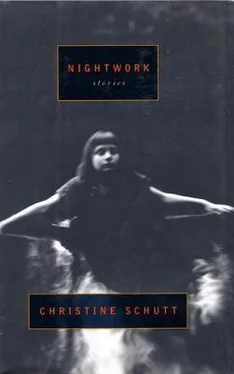Barbara Claffey knows how to wad a pair of socks into bundles tight as baseballs.
“But does she know how to kiss?” Mother asks, shuffling through bills and bills and more bills, saying, “This is what I have to do now. I have to figure out how to pay for things.”
• • •
I have to do nothing. Nothing, nothing long into the afternoon with the morning just-remembered light rising in her room.
“No reason to panic,” is what Mother says, and she looks over her shoulder as if expecting trouble, when all I want to know is. What is there to do? “I’ve left things for dinner,” Mother says, and takes up her glass and makes like this is coffee she is drinking, and she, a busy lady, elbowing the fridge, on the run, no time to talk, when she is talking all the time to friends in other, smarter towns. I sit between my mother’s legs with my shirt hitched to my shoulders. “Scratch,” I say. This way, I don’t mind when it is phone, phone, phone. This way, there is company.
“The tomatoes are alive,” I say, in the kitchen again, worrying about my dinner. I lift off foiled lids to things she should have thrown away: jellied gravy, old rice.
“I can guess what you’re thinking,” Mother says, “but all that Barbara Claffey could do was fold cubed fruit in Jell-O.”
I know how to mix drinks and make good scrambled eggs, buttery and smooth and not overstirred.
I know how to use a phone if I can recall a number.
“But there is never any paper,” I say. “And where are all the pencils?” Not like when the last Jack was here and bringing home the pens he said he stole from office girls. Big on where to put things, that Jack, left and right, above, below. The boxed cuff links, the money clips, the sized and guttered coins at the front of the drawer he shared with Mother.
The last Jack was particular even to the way he ate. “Remember?” I ask her. I used to pester him about the melon rinds he left scooped smooth as boat keels, or the ears of corn with each pocket emptied yet unbroken and erect. How did anyone eat corn, I wanted to know, so that the cobs, stacked four- and five high on the plate, looked like something you could eat again?
“Oh, Jack,” Mother says. “His problem was he didn’t drink enough.”
“And his handwriting,” I say, and Mother scowls at me. She does not remember his lists of what he left for us to do. The dashing caps on his capitals or the evenness of his hand, word by word, line by line, on unlined paper. Only business, that Jack said.
The white in his hair — why, white paint, what else? And the red in his eyes, just red string. I believed him.
Mother says, “He only looked like some big deal.”
Under the kitchen table, I licked this Jack’s plump shoes, both. But neither tasted of anything I knew of.
“Look,” Mother says, and I can see her looking out from the crack in the door she leaves open when she pees. “You can always lock the door.”
My mother soaping her throat is what I hear, and soaping the ledge along her throat where she sometimes lays her hand when she is quiet.
“This is the plan,” she is saying. “Someone handsome is on his way here. His name is John,” my mother says, “but we know what that means.”
Black hair, I think, buzzed to a shadow at the back of the neck.
“This new Jack is different,” Mother says. “This new Jack has some style. Not like the last Jack with his surf and turf or turf and surf — whatever the shit, on your first night out. Here’s style for you, the last Jack’s idea: snifters of candy on every table. What a dunce!” Mother says, handing me her puff and powder, showing me her back.
I white out trails of water leaking from her snarled hair.
“I know about a lot of things,” Mother is saying, “but I do not know about men. Only this,” Mother says, stepping from the damp and powder-traced impressions of her feet. “This last Jack had no taste. This last,” Mother says, “I dressed him. Remember the suits?”
I remember coats, gray and odorless, square-cut and severe — the same, the same, shrilling on the closet rod.
“The cashmere sweaters?” Mother says. “In case he read a book.”
I remember hats — not stiff, not Grandfather’s hats, those upside-down coffins, but soft hats slumped at ease.
“Jack and his affable act,” Mother says. “But he was handsome,” Mother says. “I got carried away.”
All those ties my mother bought him — so many, a ladderwork contraption looped with ties, one over another, sometimes slipping loose, falling in a faint behind the shoe racks. I have found these ties in the back of Jack’s closet and used a broom handle on them.
“Do you have to go out?” I ask Mother, and I follow her from room to room.
“I have to think,” Mother says, putting on her model’s coat, looking through her closet. Dressing for this new Jack as she did for all the others takes up lots of time, she says. The purses packed like eggs, the mixed-up shoes all hooked in sacks.
“Better to be small,” Mother says, taking out her slimming skirt. “Men take care of small women.”
But I may grow to be as big as Mother. I have her hair, and what I think were once her eyebrows.
“And the rest?”
Mother smiles at me. “Takes two,” she says.
I do not have my mother’s face — that much I know. I do not have the face my mother wears for all her Jacks, smooth and lit-up and amazed. Beautiful, the Jacks all say, and she is. I have seen women stop to look at her, my mother, and sometimes even ask. Have they seen her before? Have they seen this face in magazines, the same face my mother pulls at now, pinching up her eyelids, saying, “I may be too old for this business.”
“So why do you want to go?” I ask, watching the light wash over Mother’s laid-out clothes. Slip, panties, pearls, and dress, all the whites turned old-teeth yellow.
“What do you think?” Mother asks, pouting at the mirror.
I say, “I think you shouldn’t wear that dress. And don’t let this John know you have any money.”
Mother says, “Okay, little mother. What should I wear?”
“I don’t know,” I say. “Just stay buttoned. And don’t tell this guy about me,” I say.
Mother says, “I’m not listening to you.”
“Remember the last Jack?” I ask.
“Oh that bastard,” she says, “but what do you think he was doing to me?” She is penciling eyebrows, arched and alert. “Yes?” Mother asks. “I’m waiting,” and she rubs off an eyebrow in the harsh way she did when this last Jack was here and she was always washing, saying she smelled bad — and Mother did not smell bad.
Night after night, dinner on the porch at the glass-topped table, me between the two of them, this last Jack and Mother, I sometimes got the smell of her confused with food and snatched her wound-up lipstick once and bit her red in half. I remember.
Under the glass-topped table, I saw my mother’s long brown legs crossed at the ankles, thucking her heel in and out of her shoe.
“ ‘Do you think everything you do is so pretty?’ this last Jack said.”
I ask, “What did he mean by that?”
“Who cares?” Mother says. “He made me feel dirty, that Jack.” She licks a paintbrush to a point and outlines her mouth. Mother says, “Oh God, I have no taste in men. Do you know what that means?”
I think.
I think I do — hearing how it was when this last Jack came home. The plak-plak of his briefcase, open and shut; no other word for days.
Mother says, “He was not nice, that Jack.”
I say, “So why are you going out?”
“Because I am,” Mother says.
And she is standing now, my mother, in the spatter of her dress — back, forth, back, forth — a sweater, a purse, an umbrella in case. “Besides, I am hungry,” Mother says, “for surf and turf — who cares? I won’t be paying for this stupid meal, and if the man has any manners, I won’t know the price.”
Читать дальше












